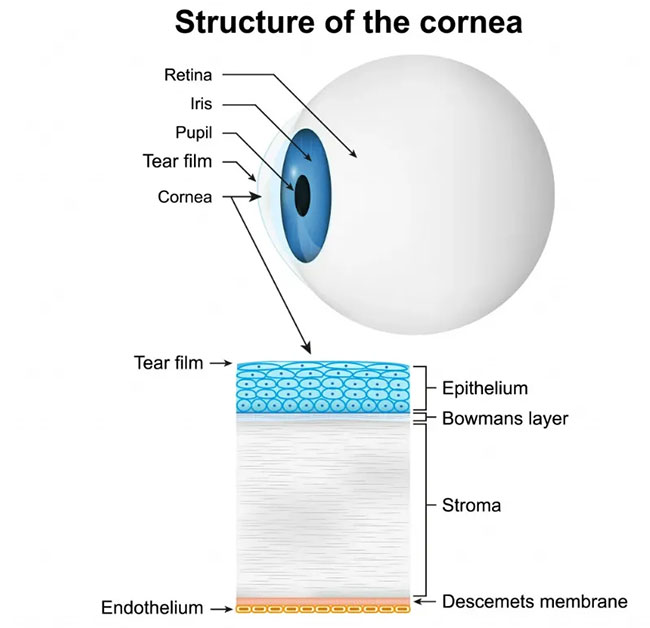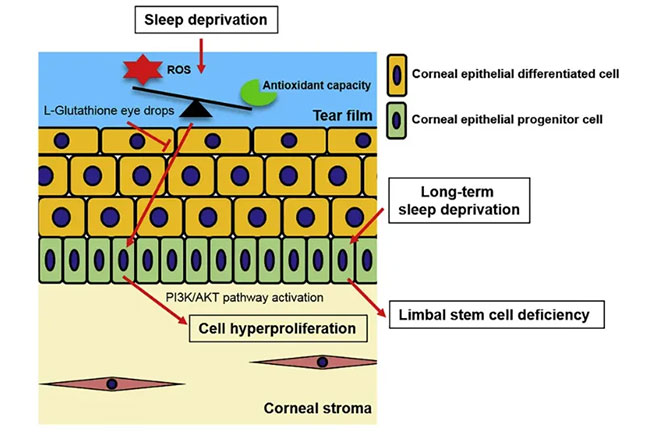Your eyes may feel itchy due to harmful oxygen molecules reacting adversely, damaging corneal cells, and prolonged sleep deprivation leading to the death of corneal cells. Lack of sleep also disrupts the tear film, which is the protective layer for our eyes.
Sleep is essential for all animal species to maintain their physical and mental health. Unfortunately, sleep deprivation is a common issue for many people due to various reasons. Whether it’s a busy work schedule, late-night gaming, or mothers with young children unable to get a full night’s sleep.
When sleep-deprived, you may feel that your eyes are becoming very uncomfortable, and they may even itch. This may not be purely an itchy sensation, but rather a result of damaged corneal cells causing difficulties. First, we will explore the cornea to understand why lack of sleep makes our eyes feel uncomfortable.
The cornea is the clear surface at the front of the eye. It acts like a protective coat for the eye, shielding it from infections, dirt, and water, while focusing light rays onto the retina for our vision. Structurally, the cornea is made up of a type of tissue containing proteins formed from different types of cells arranged in about 5-7 layers, known as the corneal epithelium. This multilayered tissue consists of various cell types, with one of the main types being corneal epithelial cells.
Surrounding the corneal surface is a fine protective layer known as the tear film, which is the first layer light encounters when it hits the cornea. This tear film provides moisture to the eyes, preventing dryness, and serves as a source of oxygen for the eye cells, along with other protective biological molecules.

Structure of the cornea.
Our body maintains its crucial corneas in a very sophisticated manner. Corneal cells are sustained by a group of stem cells known as corneal epithelial stem cells. These cells can grow and develop into corneal epithelial cells to replace old or dead cells. The cycle of replacing old corneal cells with new ones is known as homeostatic balance.
If you happen to get hit in the face with a ball and injure your eye, your corneal stem cells will rapidly develop into mature corneal cells to replace the damaged ones. This entire process occurs throughout our lives. Unfortunately, sleep deprivation disrupts this balance, leading to itchy eyes.
For most of the day, the cornea is exposed to ultraviolet rays from the sun and oxygen. Corneal cells break down this oxygen in a specialized way to release Reactive Oxygen Species (ROS). UV rays increase the rate of ROS production. These molecules, which contain reactive and unstable oxygen, damage the proteins, lipids, and DNA of the cells, ultimately leading to cell death.
Many studies have shown that sleep deprivation increases the production of ROS in the body. Interestingly, one study found that sleep-deprived individuals had tears with higher levels of ROS. This indicates that lack of sleep also raises ROS concentrations in the eyes. A study published in April 2022, conducted on mice, brought us closer to accurately answering why our eyes itch. It found that these harmful reactive oxygen molecules damage corneal cells, while prolonged sleep deprivation leads to corneal cell death.
However, this is not the complete picture. Sleep deprivation disrupts the corneal cell cycle, or homeostatic balance, causing corneal stem cells to divide and develop rapidly, leading to earlier depletion. Additionally, reactive oxygen molecules rapidly destroy already developed cells, while corneal epithelial stem cells grow faster than normal.

Sleep deprivation causes corneal epithelial stem cells to expand excessively by disrupting the redox homeostasis in the tear film.
The gene expression of corneal epithelial cells is also disrupted. Research shows that over 300 genes are not expressed normally. Such genetic changes may explain why corneal epithelial stem cells divide so rapidly. Furthermore, there are reactive oxygen types that damage the tear film – the safety shield for our corneas.
All of these biological impacts irritate and discomfort our corneas, leading us to rub our eyes continuously. But don’t worry too much, as our bodies have a great self-care mechanism.
Sleep deprivation is a hassle for many people around the world, but not everyone suffers the same eye damage. This is because our bodies have many self-protective molecules to shield our eyes from such damage. In addition to providing moisture and lubrication, it contains antioxidant molecules like vitamin C (ascorbic acid) and cysteine, which help protect the cornea from ROS damage, or release antioxidant enzymes to break down ROS molecules.
However, such defenses do not last forever. Eventually, chronic sleep deprivation takes its toll, and the damage inflicted on the body may become irreversible. If sleep deprivation continues, the condition of the tear film will worsen. This will weaken the protective ability of the tear film (i.e., its antioxidant capacity). At this point, the burden of oxidative stress exceeds what the eye’s antioxidant mechanisms can handle, leading to oxidative damage. The best thing you can do for your body now is to ensure you get stable and quality sleep.
 Sleep deprivation is a hassle for many people around the world.
Sleep deprivation is a hassle for many people around the world.
Some people do not get enough sleep regularly. In such cases, seek help from your ophthalmologist and consider purchasing some eye drops that may alleviate your discomfort. However, remember that high-quality sleep is the best thing you can do to maintain good health – for your eyes and every other part of your body.
We hope that further research will focus on developing antioxidant eye drops or medications that can help eliminate genetic disorders in the eyes, potentially helping to combat eye discomfort in sleep-deprived individuals.


















































